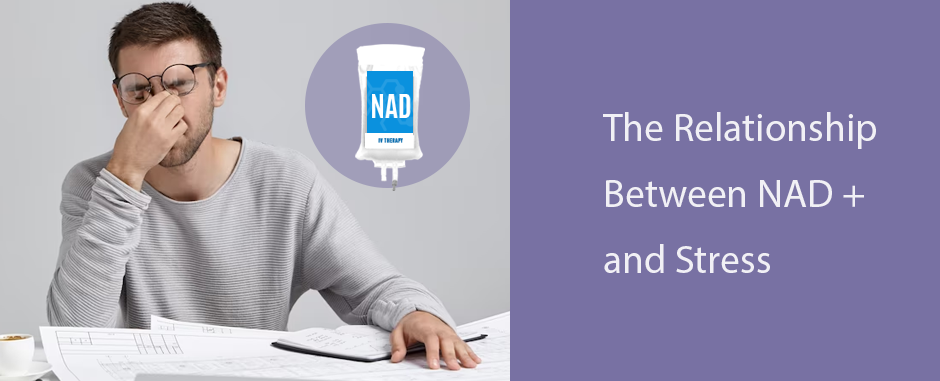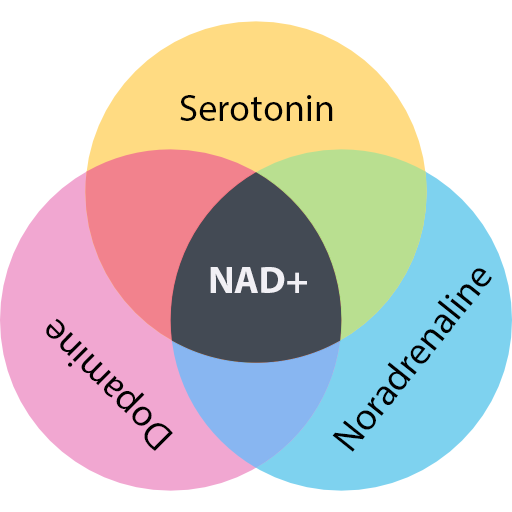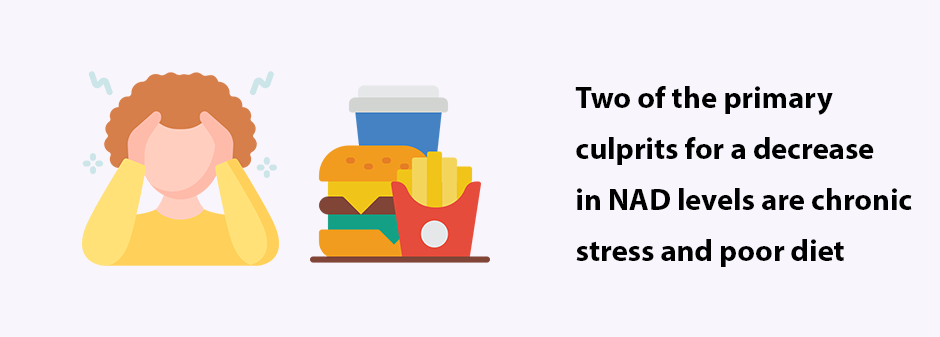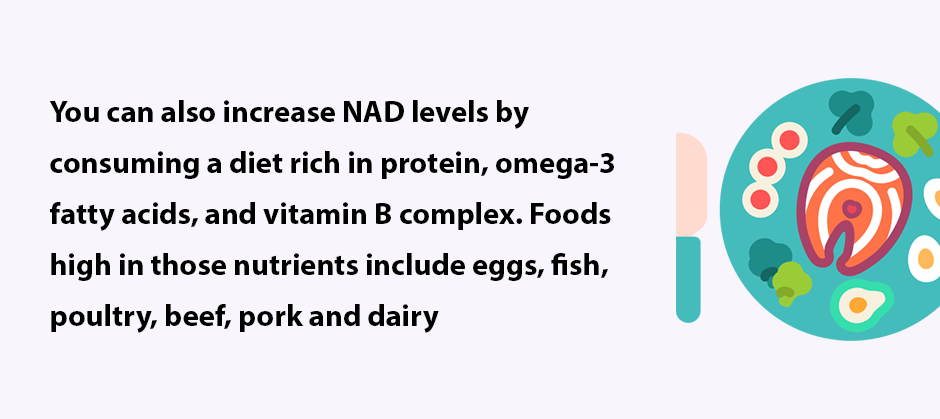
There are so many things that you’ve learned to do in a New York minute, but beating stress and its effects requires you to slow down and take care of yourself.
Doctors, researchers, and medical professionals have long attributed glitches in the mind-body connection with a host of ills. Nutritional and chemical imbalances within the body can lead to mental and even emotional problems that, in turn, create more physical stagnancy and disease.
This is especially the case when it comes to the nutrient Nicotinamide Adenine Dinucleotide (NAD). This co-enzyme is a derivative of niacin—also known as Vitamin B3 or NAD Plus—which helps to convert the nutrients we get from food into energy that our bodies can use. Niacin is plentiful in animal-derived foods like meat, milk, and grains, but people who are vegan, or who avoid eating meat, are often severely deficient.
Learn how NAD helps to modulate stress and improve your mood.
How NAD Helps Manage Stress
NAD is responsible for initiating the production of several chemicals in your body called neurotransmitters. They manage your sense of happiness, concentration abilities, and focus. These include:
- Serotonin: This hormone helps to regulate your cycles of sleeping and waking. It is responsible for mood modulation, memory, and cognition. Serotonin is also responsible for the brain’s reward function and helps to regulate learning.
Serotonin comes mostly from tryptophan, an amino acid that’s found in the lining of the gastrointestinal tract. Only about 10% of serotonin is produced in your brain. After its production in the gut, it needs to be absorbed into the bloodstream and distributed throughout your body.
- Noradrenaline: This hormone, also called norepinephrine, is the initiator of the fight-or-flight response, and is produced in the adrenal glands. It is the chemical release that’s set into motion once when the body detects a threatening stressor.
The production of noradrenaline can be triggered by intense emotion, pain or injury, or even a loss of blood pressure and low blood sugar. Its onset is signaled by increased anxiety, dilated pupils, trembling, and perspiration.
- Dopamine: This hormone is also made by your adrenal glands and is produced when you experience pleasure. It regulates your experience of motivation, achievement, and satisfaction. You’ll feel this mood-boosting chemical in action whenever you do something that gives you a sense of pleasure or gratification, although the response can vary from person to person.

Causes of NAD Depletion
NAD is naturally occurring, but there are several things that can deplete its reserves, leading to increased symptoms of stress, anxiety, depression, PTSD, and other serious mental ailments. Two of the primary culprits for a decrease in NAD levels are chronic stress and poor diet. Hours blur into days as we rush from one task to the next, grabbing fast foods on the go to temporarily stave off hunger.
The National Institute of Mental Health (NIMH) estimates that 1 in 5 people in the United States suffers from some form of clinical mental illness. Chronic stress and the inability to effectively manage it not only lead to mental health issues, but they can also be forerunners of diabetes, heart disease, hypertension, and cancer.

How to Boost NAD Levels for Stress Management
The fast pace of modern life comes with a lot of excitement and constant changes within society, but it often moves too fast for people to develop consistent and holistic habits. Some rely on pharmaceuticals or alcohol to cope, but those solutions further deplete NAD reserves. By contrast, exercise is a productive way to manage stress that actually boosts NAD levels throughout the body.
You can also increase NAD levels by consuming a diet rich in protein, omega-3 fatty acids, and vitamin B complex. Foods high in those nutrients include eggs, fish, poultry, beef, pork and dairy. A nutrient-rich diet that includes those foods provides NAD to support your neurons and your cellular mitochondria, where energy is produced.
If you are unable or unwilling to consume dietary sources of NAD, you may need supplemental NAD treatment for stress management. While there are oral supplements available, intravenous infusion is the most efficient way to deliver NAD, since the nutrient is dripped directly into your bloodstream, bypassing your digestive tract where potency is often lost.
Studies have shown that NAD IV therapy can significantly reduce the symptoms of stress, anxiety, PTSD, and even chemical dependency, since it helps to detoxify the body and restore its natural chemical balance.
In addition, NAD IV therapy is recognized by the FDA as an effective treatment for substance withdrawal, dramatically reducing withdrawal symptoms, curbing cravings, and restoring the body’s natural chemical balance.

Get Safe and Effective NAD IV Therapy in NYC
Slowing your roll to manage stress can seem impossible when urban living makes round-the-clock demands. But failure to manage stress can make you sick and tired, and stress accelerates the aging process. To make matters worse, NAD levels drop significantly as you age, making NAD therapy even more crucial to your health and wellbeing.
If you’re ready to take charge of your stressful lifestyle, why not start with an NAD IV therapy session? Relax in our spa-like clinic while NAD is infused, drip-by-drip, into your bloodstream. Enjoy a blissful hour of reading, scrolling social media, or even take a nap during your NAD IV session! Our clinic is staffed by licensed clinicians, and since NAD is a nutrient and not a drug, you don’t need a prescription to replenish this vital coenzyme.
Contact InVita Wellness today, and take charge of your health by combating stress with NAD IV therapy.